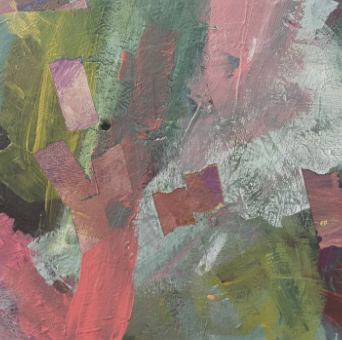Matapiata | Centering our voices and experiences
Published:
June 19, 2025

Centering our voices and experiences: Developing a twin-track response to family and sexual violence against wāhine whaikaha, D/deaf and disabled women.
Whakarakatira te tākata,
ahakoa ko wai, ahakoa nō hea.
Respect and treat all with dignity,
irrespective of who they are and
where they come from.
Can you tell us about the mahi you’re leading and the impact you’re seeing in your community?
Since the establishment of Te Aorerekura, the National Strategy for Eliminating Family and Sexual Violence in 2022, there has been increased attention on how the violence sector responds to disabled people who experience sexual and family violence. Within the Strategy itself, the ‘twin-track’ approach is recognised as an ideal response to violence experienced by disabled people. How the twin-track approach can be operationalised, however, has not previously been explored.
This research project sought to bring together the voices of wāhine whaikaha, D/deaf and disabled women and kaupapa Māori and mainstream sexual and family violence services to explore how a twin-track approach might be operationalised in the context of Aotearoa New Zealand. The research was Tiriti o Waitangi and disability rights-based, with the primary goal of generating data and evidence to inform disability-responsive sexual and family violence services across Aotearoa New Zealand and beyond.
To do this, over two years, disabled and disability researchers from the research team engaged with 8 kaimahi from kaupapa Māori sexual and family violence services, 24 wāhine whaikaha, D/deaf and disabled women, 70 workers from violence response services (inclusive of police, health and disability support services, as well as culturally-based services) through three research strands. Researchers engaged with participants on three occasions to learn from their stories and document their experiences, whether it was as survivors of violence or violence responders. Through these engagements, a wealth of knowledge was collected about what is working well when it comes to disability-responsive violence response services, and further opportunities for enhancing the work that is already underway.
In the disability context, ‘twin-track’ has generally been conceptualised as two linear tracks: mainstream and specialist. Through this research, a reconceptualisation of a twin-track model has been co-developed with wāhine whaikaha, D/deaf, and disabled women, kaupapa Māori services and the family and sexual violence sector and services. This has included an understanding of access and inclusion through enhanced mainstream services and service models, and knowledge about the ways wāhine whaikaha, D/deaf, or disabled women’s lived experiences shape responses particular to their needs. The model presents more fluidity and flow between the service on offer and principles-based approach, drawing on the strengths of kaupapa Māori and family and sexual violence services’ deep knowledge and practice expertise and disabled women’s expertise by experience.
What drew you to this kaupapa, and how has your journey shaped the way you approach this work?
When considering how we, as disabled and disability researchers, could contribute to the delivery of Te Aorerekura, we knew there was a need for robust data and evidence. Globally, disabled and indigenous women experience disproportionately high rates of all forms of violence, with women with learning disabilities experiencing the highest rates. Despite this, disabled women’s experiences of family and sexual violence continue to be less recognised than for women without lived experiences of disability. Disabled women are changing this through adding their voices to the global call for an end to gender based violence and a response to the intersectional oppressions of gender, disability and culture through social change. However, research has consistently highlighted that services designed to prevent and respond to violence are rarely informed by disabled women and people themselves. In addition, workers within these services frequently report that they do not have the disability-related knowledge they need to meet the needs of this diverse group of people appropriately. As a result, in Aotearoa New Zealand, few mainstream or disability-specific services respond to family or sexual violence against wāhine whaikaha, D/deaf, and disabled women and people. Therefore, we were motivated to contribute to a space where not enough has been known or articulated.
From the outset, we recognised the importance of centring the voices of wāhine whaikaha, Deaf and disabled women. Therefore, this project was designed to ensure disability leadership across all levels of the research, including the project’s kaumātua panel, Kā Hine o Kurawaka (Māori advisory group) and disabled people advisory group. The guidance from these advisory groups, alongside disability and disabled researchers in the team and disabled contributors to the project, ensured the voices of wāhine whaikaha, D/deaf and disabled women, were prioritised at all times.
What do you love most about the mahi?
This research project is the first of its kind, where the experiences of wāhine whaikaha, D/deaf and disabled women, have been brought together with kaimahi from kaupapa Māori and mainstream family and sexual violence response sectors. It has been a privilege to listen, learn and draw on their perspectives to co-develop a violence response framework that weaves together these experiences, perspectives and knowledge, and those of the advisory rōpū using a critically informed analytical approach.
What are some of the most powerful stories of transformation you’ve witnessed through your work?
Throughout this research, the research team formed deep relationships with participants. Outlined below is a selection of feedback received from contributors, which summarises the transformation we witnessed through this work:
“I just want to say how relieved I am when I see this analysis, because I’ve never been comfortable with the two-track, twin-track, the way it was so siloed. And finding a way to sort of flow from one to the other, I actually quite like the image. I think it does express it quite well, what is needed in real life.” (D/deaf and Disabled Advisory Rōpū Member)
“I think you’ve done really well putting everything together. There’s always going to be some flaws, nothing is ever going to be an instant fix or magic pill to stop it happening or whatever, but I think you’ve got a really good job putting it together and making it accessible for everyone with all the different disabilities and cultures. I’m really, really pleased with how it’s come along.” (Disabled Participant)
“I think this whole thing is awesome, because having that framework allows an organisation like [organisation’s name], which is a national organisation, to actually pick that up and develop learning. But we need something to build it on. So, the work you doing is really awesome, and it will break down the barriers.” (Services Participant).
What have the challenges been?
As with all research projects, there were challenges – the first being the evolving political environment. With the change in administration, we witnessed a rise in violence against disabled people and increased pressure on the services we engaged with. This was clearly articulated by the contributors to the project, who believed disability-responsive violence services should not be impacted by changes in government. However, this remains a challenge for both the disability community and the violence response sector, and for actioning the findings of this project. A second challenge was how to weave the findings from the three research strands together in a way that was respectful and attentive to the nuances within each strand. We responded to these challenges by building strong relationships with all who engaged in this research and through the guidance of our advisory groups. Most importantly, we continually reminded ourselves that this project is about centring the voices of wāhine whaikaha, D/deaf and disabled women, to ensure greater responsiveness and care for future generations of disabled people.
What inspires you, and who have your greatest teachers and mentors been?
The courage and generosity of those who contributed their experiences and stories continue to inspire our research team. Their stories were shared with trust that they would be used for change, and a determination to break cycles of violence; to heal and be healed. This research represents a commitment to ensuring our mokopuna do not experience the same breadth and range of violence that we, and the wāhine whaikaha, D/deaf and disabled women we worked with, have experienced.
What’s one whakaaro or piece of advice you’d give to others working in this space who want to create meaningful change?
Centring the voices of wāhine whaikaha, D/deaf and disabled women, brings the change that is needed. It is about standing with wāhine whaikaha, D/deaf and disabled women and their whānau long term so that their whole story is heard, not just their story of violence and abuse. Doing so will allow the strengths and progress of wāhine whaikaha, D/deaf and disabled women, to be acknowledged and to guide the way forward.
If you would like further details about this kaupapa, you can contact:
Brigit Mirfin-Veitch bmirfin-veitch@donaldbeasley.org.nz
Watch below the amazing session about this important kaupapa. Mātaki mai!


